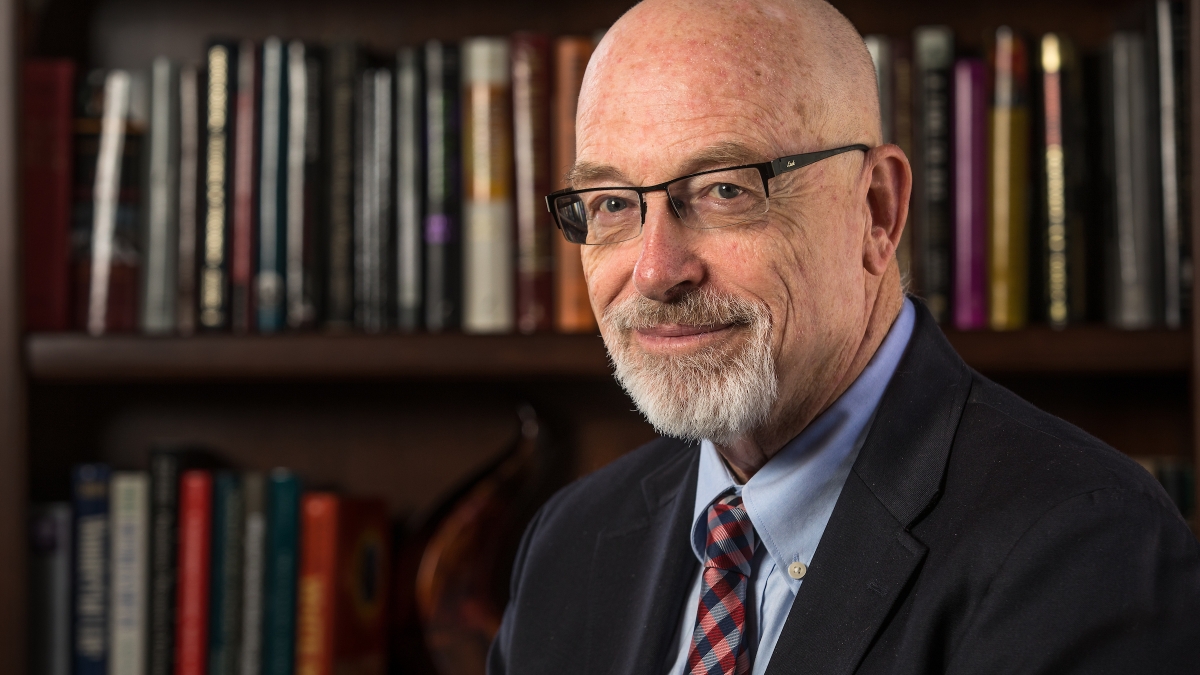ASU Regents' Professor studies collaboration, organization theory

Why don’t things work? That question has driven Barry Bozeman during a lifetime of inquiry into such diverse topics as why red tape mucks up government, how gender affects scientific collaboration and the ways that society can achieve public values.
The Arizona State University professor has written papers on faculty job satisfaction, ticket scalping, the 2004 flu epidemic and the 2010 Gulf of Mexico oil spill.
Bozeman is an expert in organization theory and public policy — how people work together and solve problems.
And he’s been so outstanding that he’s been named one of four ASU Regents' Professors for the 2017-18 school year — an elite distinction achieved by only 3 percent of his fellow faculty members. It’s the highest faculty honor and is conferred on full professors who have made remarkable achievementsThe other three ASU Regents Professors are Hava Tirosh-Samuelson, Daniel Bodansky and Thomas Dishion. This is the third Regents professorship for Bozeman, who also received the honor while on the faculty at the University of Georgia and Georgia Tech. that have earned national and international distinction.
Bozeman is the Arizona Centennial Professor of Technology Policy and Public Management in the School of Public Affairs, in the College of Public Service and Community Solutions on the Downtown Phoenix campus. He is also director of the Center of Organizational Research and Design. He’s written or edited 15 books and more than 120 research papers.
His work across many topics is by design.
“One of the things that keeps me going all the time is to try something new, so I don’t feel any compunction about moving into a new area and doing something I’ve never done before,” he said.
Bozeman earned master’s and doctoral degrees in political science. In between those degrees, he worked as a crime reporter at a newspaper, which he describes as “excellent preparation for being a scholar because you had to do all your work in the field and compose stuff on the fly.”
He was especially interested in science policy and worked for a year at the National Science Foundation, where he grasped the inner workings of how funding is determined and distributed. Since then, he’s done a lot of work on how to design and evaluate scientific institutions and technology centers.
That led to his research over the last decade into scientific collaboration, a trend that’s grown enormously.
“We found that about 94 percent of all research studies are collaborative and involved a team,” he said. “That was not true in the 1960s and ‘70s.”
That might be good for science, but it’s not always a straightforward benefit to the scientists.
“One of the primary things that has changed is how you receive credit. For example, if you’re a university scientist and you’re going up for tenure and promotion and you work in very large teams, maybe 20 or more authors on a paper, how much credit should you get for that?”
The potential for conflict and disagreement can rise with the number of people in a collaboration, he said — particularly when the group spans cultures.
“They might have the same scientific culture but that doesn’t mean they have the same attitudes about knowledge, about intellectual property or about gender,” he said.
“In some countries, if you go to a scientific conference and you’re a woman, you’re put into a separate room where they broadcast a video so they don’t integrate the men and women. You can see why that would be an impediment to science.”
Bozeman said he’s always been drawn to “bureaucratic pathologies,” particularly involving red tape, and now has a grant from the National Science Foundation to look at rules and regulations.
“We’re trying to measure how investigators — scientists and engineers — respond to the administrative burden, the compliance problems they see, the kind of help they get and the kind of help they need.”
Another area he explored in the past few years is sports economics and policy. His study of ticket-scalping markets at Arizona Diamondbacks games, which was published recently in Social Science Quarterly, found social value in the practice.
“They police themselves,” he said. “It would be difficult for someone to cheat because the other groups would be on them in a minute because they don’t want to lose their ability to cultivate customers. They also police counterfeit tickets.”
While he’s a prolific researcher, Bozeman also loves the classroom and teaches both graduate and undergraduate students.
“’I’ve had a fun and interesting career with a lot of opportunities and I’ve gotten recognition that I’m pleased about, but I never deceive myself that anything I’m doing is more important than teaching,” he said.
Heather Rimes can attest to that. Bozeman was the doctoral adviser for Rimes, who is now an assistant professor of public administration and public policy at Western Carolina University.
“It’s energizing to be in an environment where you are surrounded by others who are passionate about their work, and Barry cultivates this environment wherever he goes,” she said.
“Personally, during my time as Barry’s student, I built confidence as he took my ideas seriously while simultaneously pushing me to think about concepts from different perspectives and to further develop as a researcher.”
Bozeman enjoys the undergraduates in his program, most of whom are first-generation college-goers, like he was.
“They’re not in any sense entitled. They’re people who are trying to improve themselves and I identify with them,” he said.
Among the thousands of young people he helped along the way was ASU President Michael Crow. Bozeman served as Crow’s doctoral adviser at Syracuse University and the two have remained friends and colleagues, collaborating on several books.
“I think a lot of what he’s done here is remarkable,” Bozeman said.
“The part I’m really attracted to is the idea of inclusiveness — the idea of economic and social opportunity for students. Not only is his heart truly there, but so is mine.”